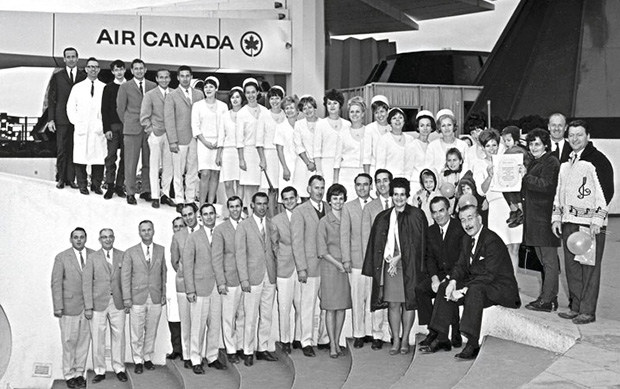February 20, 2015 at 5:15 PM
PDF - Notes from Negotes 
Shift trading is a win-win for members and Air Canada
Shift trading is a time honoured tradition that has
taken almost 50 years to evolve into its present form. Ask any Air Canada employee
– young or seasoned – what one of the most important aspects of their job is and
they will say: flexibility.
Management at Air Canada have lost sight of the
fact that shift trading is the sacred cow of sales agents.
In a country that offers little help in the way of
child and elder care, the flexibility of shift trading has allowed members at
Air Canada (who must work shifts around the clock and in every season) to create
timetables that allow them to care for their dependents and/or pursue other
endeavours like higher education for themselves and their children.

1967 - the year that gave us Expo and shift trading
This debate brings to light many issues.
Although it has thrown a wrench into negotiations, this debate brings to light
many issues, one of which is the pay scale for new employees. Shamefully, now
that part-time, minimum wage work is standard in the airline industry, picking
up extra shifts is often the only way for many of our members to make ends meet.
All workers at Air Canada deserve to earn a living wage and to be equally
recognized for their contributions.
The company’s intention to unilaterally alter the
shift trading process completely changes the conversation in bargaining and has
forced the committee to suspend contract talks until we deal with specific
issues.
The collective agreement needs to reflect
the new reality occurring at Air Canada.
These changes require
reviewing our entire collective agreement. The company’s 24/7 schedule relies on
the fact that members will shift trade to accommodate medical issues,
appointments, child care issues, etc. The vast majority of our members are
accustomed to fitting their life into the cracks of their erratic shift
schedules because time-off requests are virtually never granted.
We are ensuring that the parameters of the
Canada Labour Code are fully employed.
We understand the requirement
to be legally compliant, however pieces of Labour Standards under Part III of
the Canada Labour Code cannot and should not be quoted in isolation. Labour
Standards provides flexibility – workplaces within the federal sector work a
variety of schedule types and respond to varied operational requirements which
are driven by issues such as seasonality.
The company is currently reviewing a list of
proposals developed by your bargaining committee that address the company's
concerns, legal components and preserve our member’s ability to shift trade.
Prior to the shift trade issue taking precedence
over negotiations, discussions were moving along at a steady pace. Once this
issue is resolved we will resume our regular agenda. We will continue to keep
you informed of any progress that we make.
Throughout this ordeal, the committee has
continued to keep your leadership informed so that they in turn, can keep YOU
informed. We hope the following will help to clarify our position on some of the
concerns and issues that have been raised:
Hours worked
The Canada Labour
Code specifies maximum permitted work hours as 48 hours a week including
scheduled hours, shift trades, and overtime. However, there is an allowance for
these hours to be averaged over longer periods. The Canada Labour Code
contemplates mutual agreement between the company and the union on the averaging
period. The union believes that an averaging period of longer than a quarter
would be more reasonable to minimize the impact of positive pay on a member’s
wages, and to provide more flexibility on the maximum hours of work a member can
work during that period.
Increasing the maximum hours
The maximum hours of work in
a year are 48 hours X 52 weeks or 2496 hours per year. Things such as vacation
time, and bereavement leave are not to be included in the 48 maximum hours per
week. For example, if you are full time and are entitled to 4 weeks (160 hours)
of vacation, you would be entitled to work 2496 + 160 or 2656 hours per year.
Positive pay
There is an obligation for companies to report income for
hours actually worked and to make and report appropriate deductions (such as EI
and CPP). The only way to achieve this is through positive pay. Positive pay
means that you get paid or credited for the hours actually worked. Your pay
cheque (or time bank) will be reduced for hours not worked.
Minimizing
pay impact through time bank usage
• One-way shift trades: the company pays
the person working the shift their rate of pay.
• Two-way shift trades: the
company pays or credits the person working the shift. The person who has given
away the shift(s) could have their time bank deducted in order to minimalize the
impact on their pay.
Implementation date: April 1, 2015
Many members
already have shift trades in effect and the committee recognizes that the
implementation date of April 1 is causing great anguish. We have requested that
any changes be in effect later in the fall.
Your Air Canada Bargaining Committee
Connect with Unifor 2002 on social media




/15-02-20 Air Canada notes from negotes HTML en.txt